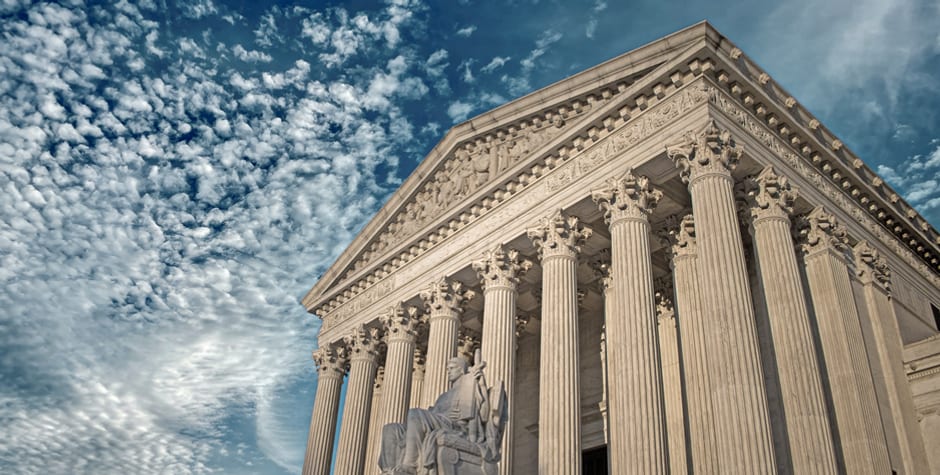ACLJ Taking Major Public Prayer Case to the U.S. Supreme Court
The ACLJ is gearing up to file an application with the United States Supreme Court for a writ of certiorari in our case defending prayer. We will petition the Supreme Court to address a question of fundamental significance that has plagued the lower courts across the country for decades: whether voluntarily seeking out and being offended by government conduct that allegedly violates the Establishment Clause creates an “injury in fact” sufficient to allow a complainant standing (i.e. the ability to bring a legal challenge).
It's often called “offended observer” standing and it has plagued our federal judiciary for years, improperly allowing anti-Christian forces to run to federal court and claim a constitutional crisis every time they see a public official in any way practice his or her Christian faith, such as praying, or even the public recognition of our Judeo-Christian heritage as a nation, such as “under God” in the Pledge of Allegiance. It’s high time we set the record straight.
Our decision to file with the Supreme Court follows a lengthy legal battle that began in 2014 to defend America’s long-time tradition of calling for prayer – a freedom our Founders sought to secure, rather than prohibit, through the ratification of the First Amendment. Time and again, the Supreme Court has upheld government involvement in and/or association with prayer including legislative prayer, prayer in the military, and prayers offered by chaplains. The City of Ocala followed suit by encouraging citizens to gather for a community prayer vigil organized by private citizens in response to a crime spree in the community. Chaplains for the police department attended and helped lead the vigil. Plaintiffs then sued arguing that the City of Ocala violated the Establishment Clause.
As we previously explained:
In 2014, the City of Ocala experienced a crime spree resulting in injury to several children. The police knew the identity of the shooters but could not persuade witnesses to come forward to testify. Consistent with community policing standards regularly employed by the City’s police department, Chief Graham met with local NAACP leaders who suggested the police department reach out to the local faith-based community for help in persuading witnesses to come forward. Chief Graham did just that.
In response, community leaders decided to hold a community prayer vigil. The vigil was planned and organized by private citizens. Volunteer chaplains, along with private citizens, led the vigil that was widely supported and well attended. At the request of the organizers for the event, Chief Graham posted a letter encouraging unity and prayer and attendance at the vigil. Atheists, offended by the idea of prayer at the vigil, demanded City officials cancel the event. Despite City officials’ continued explanation that it could not cancel a privately organized event, the atheists cried foul and later sued the City for allegedly promoting the vigil.
Outrageously, the atheists admit they attended the vigil to witness what they believed would be a violation of the Establishment Clause and to protest. They filed suit, and unfortunately the federal district court ruled in their favor. So we appealed to the Eleventh Circuit Court of Appeals.
As we reported earlier this year, the ACLJ presented oral argument before the Eleventh Circuit in April. We asked the Eleventh Circuit to reverse the decision issued by the lower court which held that (1) plaintiffs had standing to bring the lawsuit, and (2) the City’s alleged involvement with the prayer vigil violated the First Amendment and must be held unconstitutional under the Lemon test.
On July 22, 2022, the Eleventh Circuit issued its decision agreeing that the district court applied the wrong legal test (the Lemon test). The Court reversed the district court’s decision and remanded the case with instructions to evaluate the facts in light of “the historical practices and understandings standard” endorsed by the Supreme Court this year in Kennedy v. Bremerton School District, 142 S. Ct. 2407 (2022). On the issue of standing, however, the Eleventh Circuit held that at least one plaintiff did have standing to sue.
As we have argued in our briefing throughout litigation of this case, and plan to do again in our certiorari petition, the Supreme Court in Valley Forge Christian College v. Americans United for Separation of Church & State, Inc., held that plaintiffs who “fail[ed] to identify any personal injury . . . other than psychological consequence presumably produced by observation of conduct with which one disagrees” do not have standing. 454 U.S. 464, 485 (1982). Simply put, federal courts are constitutionally authorized to address “cases and controversies,” not resolve “disagreement and offense.” Am. Legion v. Am. Humanist Ass’n, 139 S. Ct. 2067, 2101 (2019) (Gorsuch, J., concurring).
Our petition, on behalf of the City of Ocala, will likely be the first petition to raise the issue of whether offended observer standing is sufficient in the wake of the Supreme Court’s decision to overrule Lemon v. Kurtzman, 403 U.S. 602 (1971). As Justice Gorsuch, joined by Justice Thomas, recently observed, the lower courts “invented observer standing for Establishment Clause cases in the 1970s in response to this Court’s decision” in Lemon. Am. Legion, 139 S. Ct. at 2101. Now that Lemon is a thing of the past, so too must be any notion of offended observer standing, which was tethered to Lemon itself.
We plan to file our cert. petition asking the Supreme Court to take up this important case in the coming months. This will be a major moment for prayer and religious liberty at the Supreme Court.
